
SHINKO ELECTRIC INDUSTRIES CO., LTD.

SHINKO ELECTRIC INDUSTRIES CO., LTD.
The Shinko Group’s goal is to enhance corporate value by means of our business operations and, in doing so, make contributions to all our stakeholders, including customers and local communities. Recognizing and responding appropriately to risks that affect the achievement of these objectives is an important management issue. We have established a risk management system for the entire Group and are working to implement and continuously improve risk management practices.
In order to promote risk management throughout the Group, the Shinko Group has established a Risk Management Committee based on the Risk Management Regulations to share information on the status of risk management within the Group and to thoroughly implement risk management policies and measures.
In the promotion of risk management, we have constructed a system in which the Representative Director of Board, President, who bears responsibility and authority for risk management throughout our entire Group, serves both as the Company-wide Risk Management Officer, who promotes risk management, and as the Chairperson of the Risk Management Committee. In addition, the Risk Management Division has been established to strengthen and promote risk management across the entire Group, and it plays the role of assisting the Company-wide Risk Management Officer and serves as the secretariat of the Risk Management Committee.
In order to strengthen risk management in each division and at Group companies in Japan and overseas, a risk management officer is appointed for each division and Group company, and risk management is promoted in cooperation with the Company-wide Risk Management Officer and the Risk Management Division from the perspective of both the prevention of potential risks and the response to risks that have materialized.
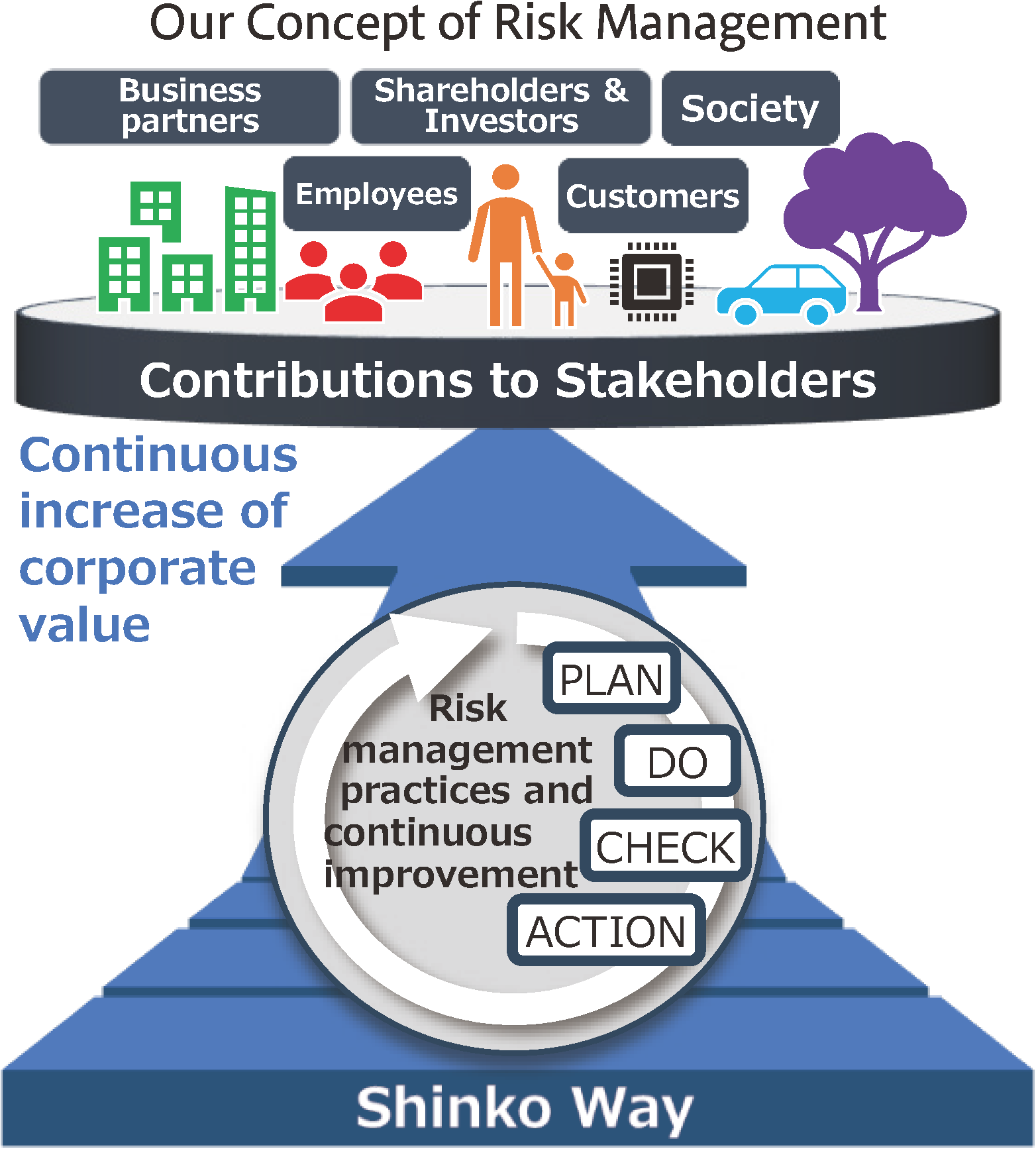
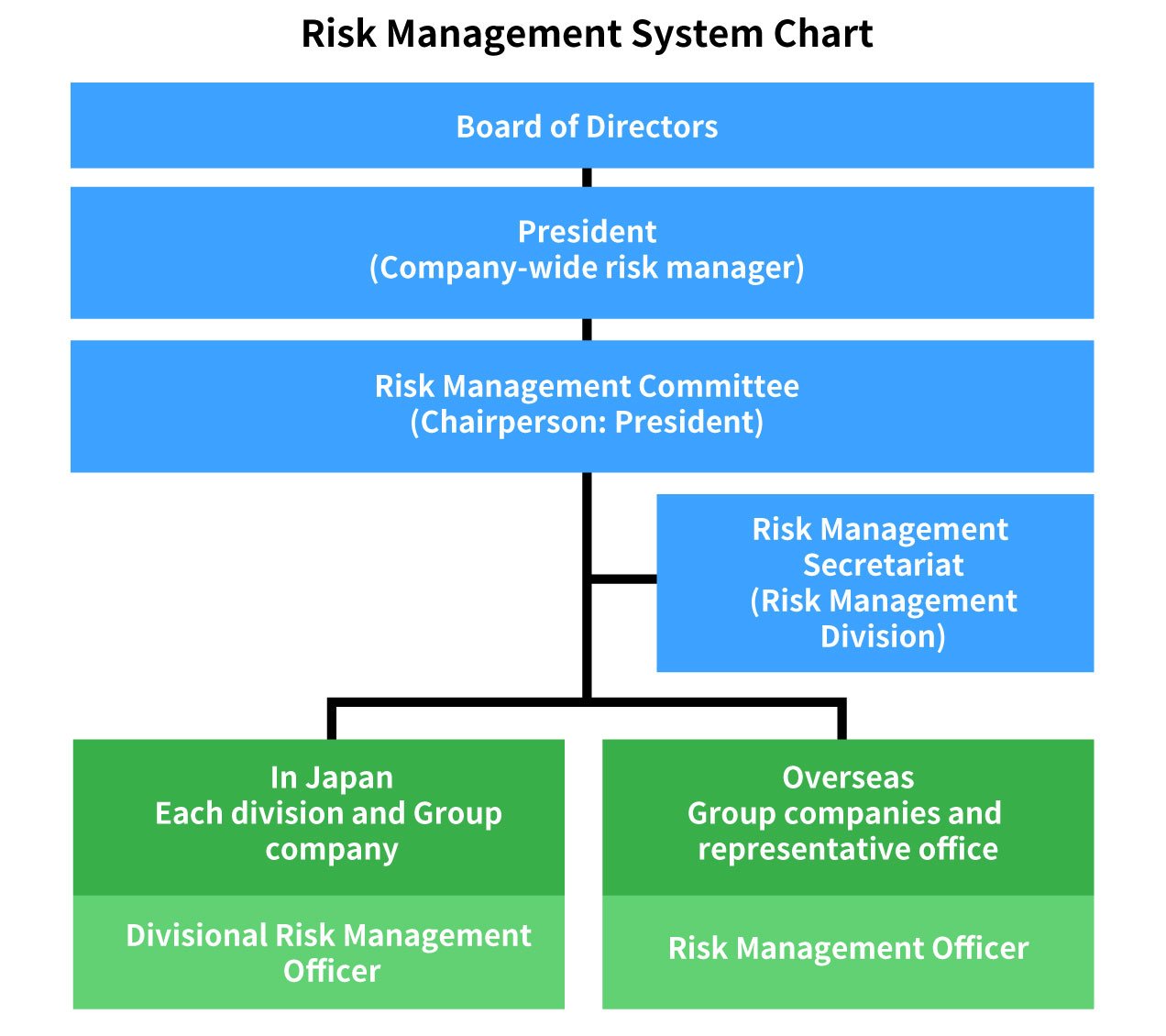
The Shinko Group identifies, evaluates, and manages risks across the Group in order to appropriately assess and respond to risks that affect the Group's business activities. We annually conduct potential risk surveys for all divisions and companies in our Group. After extracting, analyzing, and evaluating potential risks that could occur in each division or Group company, we design and implement measures to avoid, mitigate, transfer, or accept potential risks, as well as measures for responding to potential risks that have come to fruition. The risk to the entire Group is aggregated for potential risks extracted from each division and Group company, and matrix analysis is carried out on the two aspects of impact and probability of occurrence to extract material risks.
When a risk materializes, the Risk Management Division in its capacity as the Risk Management Secretariat takes the lead in sharing information with the relevant divisions in a timely manner, and works to minimize the impact by taking appropriate measures in cooperation with each division.
Risk of Business, Etc.1
1. Risks related to trends in the economy and financial markets (economic trends in major markets, foreign exchange trends, and trends in capital markets)
2. Risks related to defective or flawed products and services
3. Risks related to suppliers
4. Risk of natural disasters and sudden emergencies
5. Risks related to competition and industry
6. Risks related to intellectual property
7. Risks related to information security
8. Risks related to the environment and climate change
9. Risks related to customers
10. Risks associated with large capital expenditure
11. Risks related to public regulations, policies, and taxes
12. Risks related to compliance
13. Risks related to human resources
1The items listed in Risk of Business, Etc. do not include all risks faced by the Shinko Group.
Shinko has drawn up Company-wide Disaster Prevention Guidelines that determine the basic thinking for a company-wide disaster prevention system in preparation for an unforeseen large-scale disaster. Based on the Company-wide Disaster Prevention Guidelines, each plant has drawn up a plant fire and disaster prevention manual and a disaster response plan that take into account the special characteristics of the location and the facility, and we are moving ahead to build a system that enables effective action during the initial stages of a disaster. In preparation for progressive disasters, such as typhoons and flooding, we have established a Typhoon and Flood Damage Timeline that sets out the conduct and the types of action required when huge typhoons and large-scale flood damage are expected. We will implement countermeasures to ensure the safety of employees and minimize damage by having every employee take effective action and evacuate before a disaster occurs.
Shinko conducts simulations and drills every year in response to various disaster and accident scenarios (explosions, leaks, etc.) to ensure safety in the event of a disaster, minimize human and physical damage, and prevent secondary disasters, as well as verify the effectiveness of its disaster prevention system and strengthen its response capabilities, and regularly conducts trainings by self-fire brigade, etc.
In addition, we conduct annual self-inspections of fire prevention and disaster prevention manuals, disaster response plans (DRPs), disaster prevention organizations, and maintenance status of disaster prevention equipment and facilities at each plant. We also conduct annual safety reporting and confirmation drills through a safety confirmation system for all employees.
We also conduct disaster prevention drills every year at each production site outside Japan in an effort to strengthen our response capability, so that every employee can quickly take precise initial responses in an emergency.
 Training for Collecting and Reporting Damage Information during Disaster Drills
Training for Collecting and Reporting Damage Information during Disaster Drills
 Emergency Drills at SHINKO ELECTRONICS (MALAYSIA) SDN. BHD.
Emergency Drills at SHINKO ELECTRONICS (MALAYSIA) SDN. BHD.
> Sustainability Report 2025 (Company-wide Disaster Prevention p87~88)
In times of unexpected disaster or serious accident, the Shinko Group makes protecting the lives of employees, employees’ families, and people in the surrounding area and preventing secondary disasters its highest priorities. While bearing in mind contributions to the public good, the Shinko Group will take the actions necessary to preserve the continuity of important businesses.
To promote business continuity management (BCM), the Shinko Group has established the Shinko Group Business Continuity Policy as the basic policy for the Shinko Group. Based on Company-wide Disaster Prevention Guidelines, each division has drawn up a business continuity plan (BCP) to determine the initial response necessary to restart and continue, within the required time, operations that are important to the organization even after unexpected situations have occurred, and to provide necessary proactive measures and training. We will continue to implement BCP measures, conduct education, training, evaluation, and improvements, do management reviews, and carry out activities to firmly establish these practices.
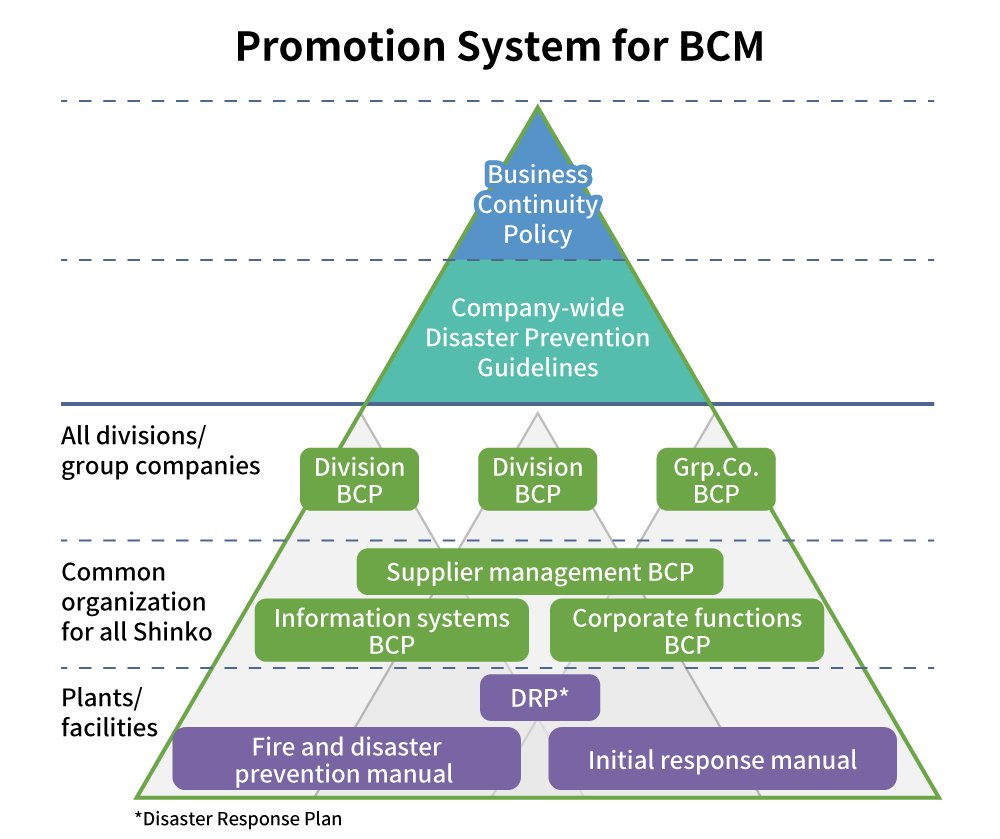
Shinko Group Business Continuity Policy
Basic philosophy
The Shinko Group works continually on initiatives to improve its ability to respond to and recover from any kind of risk, so that even in the event of unexpected natural disasters or serious accidents we can continue important operations, execute our social responsibility as a company, and achieve a stable supply of high-performance, high-quality products and services to meet customer demand.
Guiding principles (normal conditions)
- Each division decides which important operations should continue even after unexpected events as well as a recovery time objective, and systematically puts in place measures to achieve this.
- Procedure manuals are created for recovery and continuation of business in case of an unexpected event, and systematic training is carried out.
- Changes in the business environment and the outcomes of training are reviewed at regular intervals. Based on the results, the countermeasure plan and recovery procedure manuals are revised and improved.
Guiding principles (in unforeseen circumstances)
- Protecting the lives of employees, employees' families, and people in the surrounding area and preventing secondary disasters are made the highest priorities.
- While bearing in mind contributions to the public good, we will take the actions necessary to preserve the continuity of customers' important businesses.
- We will establish emergency communications with stakeholders as quickly as possible and work to provide appropriate information.
Shinko provides e-Learning on disaster prevention and business continuity as risk management education for all employees. The awareness of each employee is raised under the basic principle of "taking steps oneself to protect one's own life.“
In addition, in order to improve employees' ability to respond to disasters and their awareness of disaster prevention, we distribute pocket-sized "disaster prevention cards" to all employees and recommend that they carry them at all times in preparation for a disaster.
Due to advances in information and communication technology, in recent years there has been a growing risk of leaks of personal information and confidential information, and it is the duty of companies to strengthen information security measures.
At the Shinko Group, we see the appropriate handling of all business information as fundamental to doing business. For this reason, we have established our Information Security Policy as a company-wide approach based on the Shinko Way. We have also developed related regulations including our Privacy Policy and Information Management Regulations and are working to maintain and improve information security.
Information Security Policy
Purpose
With deep recognition that information is the foundation for conducting business and of the risks in handling information, the Shinko Group addresses information security with the following purposes, to achieve its Corporate Values of "seeking to be a valued and trusted partner for our customers, and building mutually beneficial relationships with our business partners," as expressed in the Shinko Way, and to ensure the "confidentiality" stipulated in our Code of Conduct as an important aspect of our social responsibility.
- The Shinko Group will appropriately handle information received from individuals and organizations among its customers and business partners in the course of its business and will protect the rights and interests of those individuals and organizations.
- The Shinko Group will appropriately handle trade secrets, technical information, and other valuable information in the course of its business and will protect the rights and interests of the Shinko Group.
- The Shinko Group will appropriately manage information in the course of its business and will maintain its social function by providing a timely and stable supply of products and services.
Principles of Initiatives
The Shinko Group will take the items below as the principles of its initiatives for information security.
- The purpose of our information security will be to maintain the confidentiality, integrity, and availability of information handled, and we will devise information security measures to achieve this purpose.
- We will clarify systems and responsibility, to implement information security measures appropriately and reliably.
- To maintain our information security measures, we will develop processes at each stage in the cycle of planning, implementation, evaluation, and improvement to maintain and raise the level of our information security.
- To implement information security measures appropriately and reliably, we will provide officers and employees with awareness building and training on information security to impress its importance and make sure that people take action.
- To implement information security measures appropriately, we will consider the risks involved in handling information and the investments required for countermeasures.
The Shinko Group's Measures
To implement information security measures reliably based on the above purposes and principles of initiatives, the Shinko Group will develop and implement pertinent regulations.
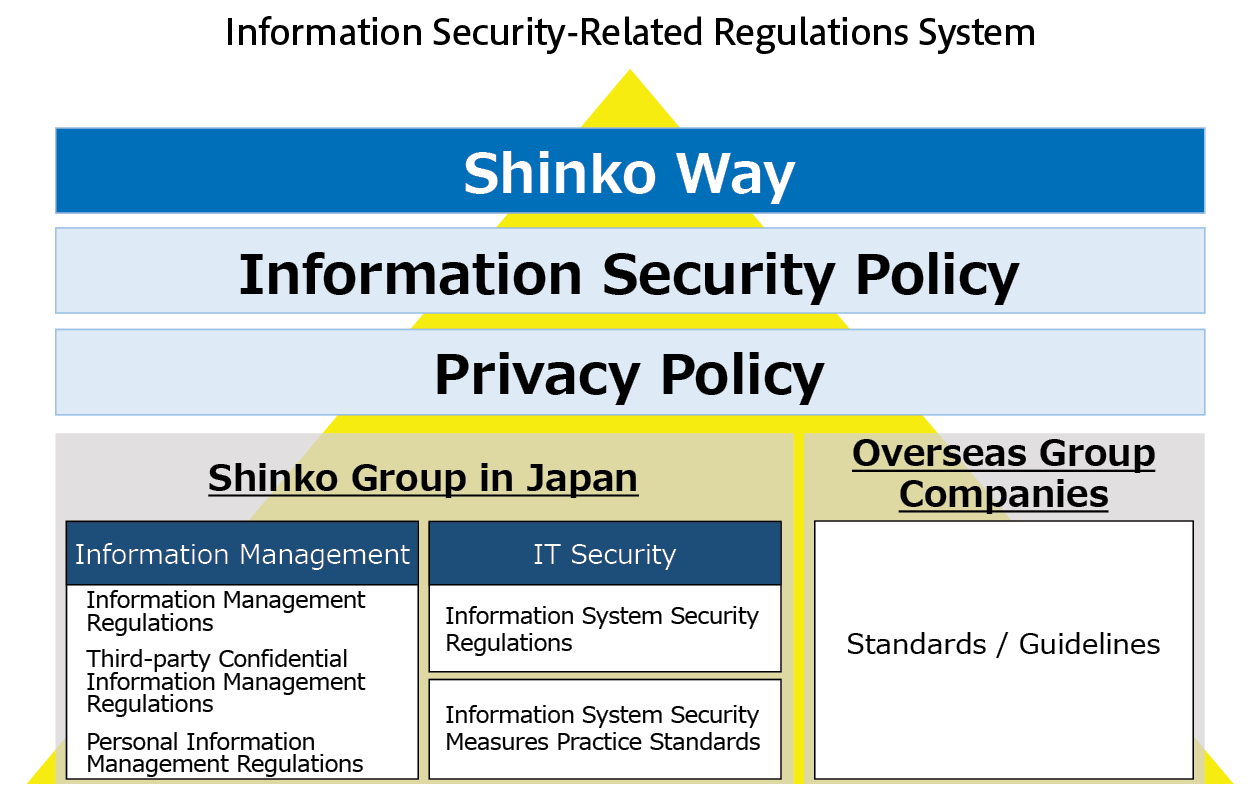
The Shinko Group has established the Information Management Regulations as rules for handling information distributed within the company and the Third-party Confidential Information Management Regulations as rules for handling information obtained from customers and other companies to classify, and manage and operate it appropriately. In addition, the classified information is rated from multiple viewpoints such as legal requirements, value, and importance, and the information is protected by taking security measures according to the rating.
In order to properly protect third-party confidential information and Shinko Group's own confidential information, the group has set up appropriate management for information handled in business. We are also striving to strengthen information protection by establishing an information protection management system that checks the status of activities through regular information protection initiatives and internal audits.
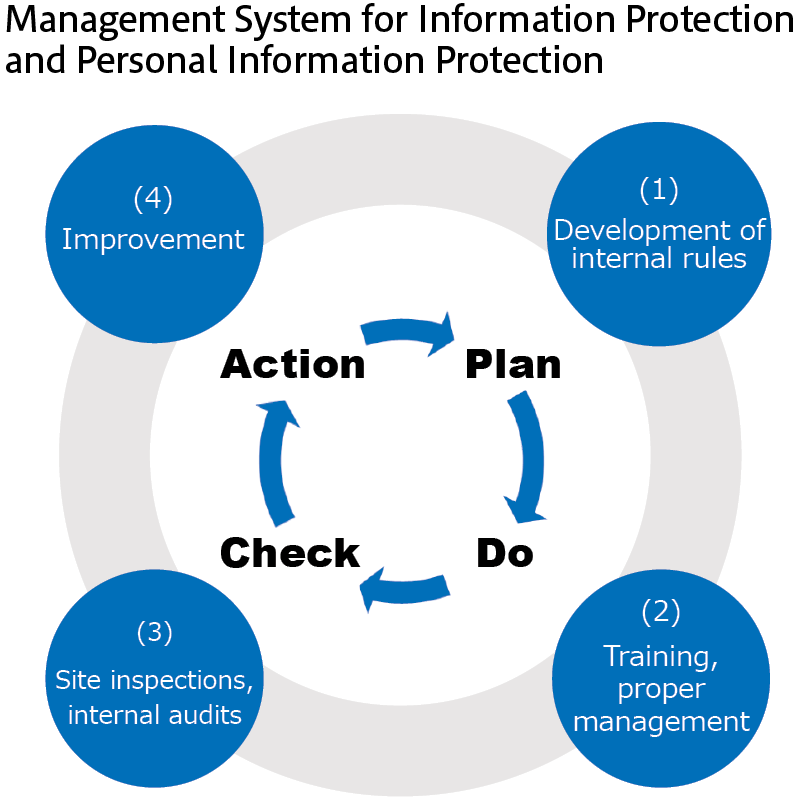
To prevent information leaks, the Shinko Group believes it is important for every employee to be fully aware that neglecting information security rules is a risk that could lead to serious security incidents. We therefore see to it that the rules are followed without exception and work to increase awareness of security. As part of our efforts to raise employee awareness, we provide information security training through e-Learning and group training for all employees of our Group in Japan and overseas.

In the years ahead, we will continue to enhance information security awareness throughout the Shinko Group by implementing the education programs.
Based on the philosophy of respecting individuality, the Shinko Group is deeply aware that it is the group's corporate social responsibility to handle personal information appropriately. We have established our Privacy Policy and Personal Information Management Regulations to protect and respect personal information.
With regard to personal information used in business operations, we are striving for proper management and operation through the personal information protection management system.
In addition, we are strengthening the protection of personal information in order to properly respond to personal information protection laws overseas including the EU General Data Protection Regulation (GDPR).
